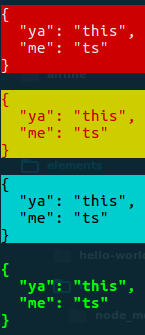
console.log ging done right, beautifully.
You don't have to write the 13 char long console.log() anymore. Try:
lme.d("hello world");
Why lme ( logme )
- Simpler to use than
console.log() or even console.log(chalk.red("hi")); - Automatically expands
objects and arrays. So that, you don't have to use JSON.stringify() anymore. - Clean and semantically focused.
- Actively maintained.
- Consistent design for errors, warnings, successes etc.


Install
npm install --save lme
Usage
Syntax
lme.<status>(message);
Example
const lme = require('lme');
lme.d("my kitty is pinky!");
lme.e("Snap! something went wrong.");
lme.s("Oh yeah!");
lme.w("Attention! Thank you for your attention.");
APIs
Syntax : lme.<status>(message);
- where
<status> can have the following values:
| status | name | when to use | example |
|---|
d | default | default output | lme.d("hi"); |
s | successes | on success output | lme.s("hi"); |
e | error | on error-ed output | lme.e("hi"); |
w | warning | for warnings like output | lme.w("hi"); |
h | highlight | for highlighting an output | lme.h("hi"); |
where message can be string / float / int / objects. (note that javascript treats arrays as objects.)
More configurations are on its way.
If you wish to file any feature/bugs, mention it on issues.
Enjoy.
License
MIT © Vajahath Ahmed






